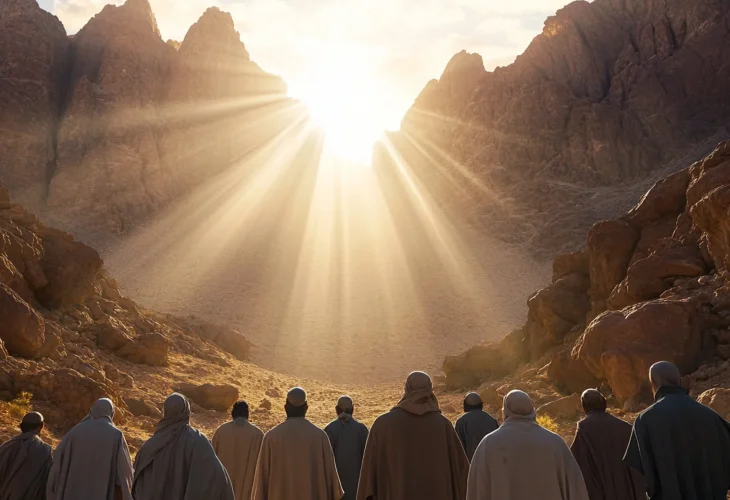In Search of God
The Divine Selection: Why Only Israel Received the Torah
The spiritual and historical journey that led to Mount Sinai — how God offered the Torah to all nations, why only the Jewish people accepted it, and what this reveals about faith, free will, and the purpose of humanity

If the Torah represents the ultimate truth and the path to the purpose of human life, why was it given only to the Jewish people? If God loves all His creations, why didn’t He make His divine truth and covenant accessible to every nation on earth?
This question has fascinated not only Jewish thinkers for generations but also many outside the Jewish world. If the Torah is a light to the nations, why wasn’t it given to all humanity?
The Torah Was Offered to All Nations
The Sages teach that God did not give the Torah to Israel arbitrarily. Before Mount Sinai, He offered it to every nation. Each nation, in turn, refused.
The descendants of Edom rejected it because of the commandment “You shall not murder.” The descendants of Ishmael refused because of “You shall not commit adultery.” Only Israel accepted the Torah unconditionally, declaring: “We will do and we will hear” (Shemot 24:7).
The giving of the Torah was therefore not a one-sided divine decision, but the outcome of free choice. Humanity was given the opportunity, and only Israel said yes.
A Historical Process of Selection
The giving of the Torah was not random, but the culmination of a long spiritual process. According to Jewish tradition, the connection between God and humanity evolved through a series of moral and spiritual tests.
God didn’t simply choose Israel; Israel chose God — again and again, through generations of faith and perseverance.
From Adam to Noah: The First Tests of Humanity
The first human, Adam, was given a divine command not to eat from the Tree of Knowledge. When he failed, the direct bond between humanity and God was broken.
Later, his sons, Kayin and Hevel (Cain and Abel), represented two moral paths. Kayin's jealousy and violence caused his downfall, and the divine bond continued through Shais (Seth), the righteous son.
Generations later, in Noach’s time, humanity again faced a test of whether it could sustain a moral world. Corruption and violence filled the earth, and only Noach and his family remained faithful. After the Flood, God renewed His covenant with Noach and gave the Seven Noahide Laws, a universal moral code for all people.
The Line of Shem and the Rise of Avraham
After the Flood, Noach’s descendants multiplied, but only Shem’s lineage preserved the spiritual path — through the academy of Shem and Ever.
At the Tower of Bavel, humanity tried to establish a civilization without God and was dispersed into nations. From among them arose Avraham, a descendant of Shem, who chose to walk with God.
Avraham faced great trials — leaving his homeland, proclaiming faith in one God, and ultimately the binding of Yitzchak (Isaac). For his faith, God made a covenant with him and his descendants, sealed through the commandment of circumcision.
From Avraham to Yaakov: Refining the Covenant
Avraham had two sons — Yitzchak and Yishmael. Yishmael, though a son of Avraham, did not follow his father’s moral and spiritual path and was not included in the covenant.
Yitzchak had two sons — Yaakov and Eisav. Yaakov chose the spiritual way of his forefathers, while Eisav followed earthly pursuits. Thus, the divine covenant continued through Yaakov, who became Israel.
Yaakov’s twelve sons formed the twelve tribes, each with a unique spiritual role. The tribe of Yehuda received kingship, Levi the priesthood, and Yosef the birthright.
This was not favoritism but a process of refinement, shaping Israel into a people ready to carry divine responsibility.
Israel’s Final Test: Sinai
The Israelites descended to Egypt and were enslaved for generations. Yet despite their suffering, they preserved their faith and identity.
At Mount Sinai, they faced their greatest test. When they proclaimed, “We will do and we will hear,” they entered the divine covenant as a nation.
This was the first collective choice of an entire people to dedicate themselves to God’s will.
Why Only Israel Could Receive the Torah
Throughout history, many nations failed to uphold the moral bond with God. Only Israel, through continual testing and faith, proved capable of bearing the Torah’s spiritual and ethical weight.
It is not that other nations were excluded, but rather, they excluded themselves by refusing or failing to maintain the divine relationship.
The Torah therefore could only be given to those who had prepared for it — a nation molded by generations of commitment, sacrifice, and spiritual discipline.
The Path for Non-Jews: Joining the Covenant
If a non-Jew desires to connect with God through the Torah, the path is open — through conversion (giyur). By joining the covenantal framework of Israel, one becomes part of the spiritual nation chosen to bear the Torah.
As the prophet Yeshayahu (Isaiah) declared: “For out of Zion shall go forth the Torah, and the word of the Lord from Jerusalem.” (Yeshayahu 2:3) Divine truth now flows through Israel to all humanity.
The Torah was never intended to exclude, but to reveal the culmination of a universal process — where only those who continually choose God can truly receive His word.

